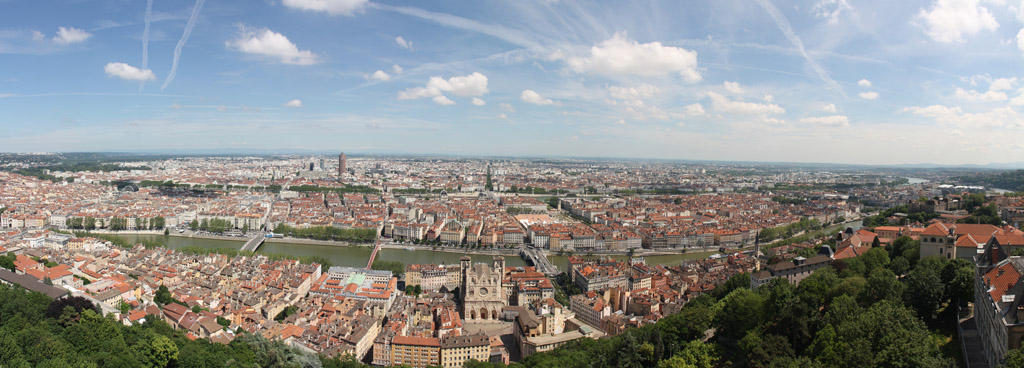About Lyon

Lyon is the third-largest city of France. It is located in the country's east-central part at the confluence of the rivers Rhône and Saône, about 470 km (292 mi) south from Paris, 320 km (199 mi) north from Marseille.
The city is known for its cuisine and gastronomy, and historical and architectural landmarks; part of it is a registered as a UNESCO World Heritage site. The noted food critic Curnonsky referred to the city as "the gastronomic capital of the world", a claim repeated by later writers such as Bill Buford. Renowned 3-star Michelin chefs such as Marie Bourgeois and Eugénie Brazier developed Lyonnaise cuisine into a national phenomenon favoured by the French elite; a tradition which Paul Bocuse later turned into a worldwide success.
The bouchon is a traditional Lyonnais restaurant that serves local fare such as sausages, duck pâté or roast pork, along with local wines. Two of France's best known wine-growing regions are located near the city: the Beaujolais region to the north and the Côtes du Rhône region to the south.
yon played a significant role in the history of cinema: it is where Auguste and Louis Lumière invented the cinematograph in 1895. The Institut Lumière, built as Auguste Lumiere's house, and a fascinating piece of architecture in its own right, holds many of their first inventions and other early cinematic and photographic artefacts.
Economically, Lyon was historically an important area for the production and weaving of silk, now the city is a major centre for banking, as well as for the chemical, pharmaceutical, and biotech industries.

Main sights
- The Roman ruins on the hillside near the Fourvière Basilica with the Ancient Theatre of Fourvière, the Odeon of Lyon and the accompanying Gallo-Roman Museum;
- Amphitheatre of the Three Gauls, Roman ruins of an amphitheatre.
- Cathedral of St. John, a medieval church with architectural elements of the 13th, 14th and 15th centuries, also the principal religious structure in the city and the seat of the Archbishop of Lyon;
- Basilica of St-Martin-d'Ainay, one of the rare surviving Romanesque basilica-style churches in Lyon;
- Église Saint-Bonaventure, 14th- and 15th-century Gothic church;
- Vieux Lyon (English: Old Lyon) area, Mediaeval and Renaissance quarter of the town, with shops, dining and cobbled streets;
- The many Renaissance hôtels particuliers of the Old Lyon quarter, such as the Hôtel de Bullioud, were also built by Philibert Delorme.
- City Hall on the Place des Terreaux, built by architects Jules Hardouin-Mansart and Robert de Cotte;
- Musée des beaux-arts de Lyon, fine arts museum housed in a former convent of the 17th century, including the Baroque chapelle Saint-Pierre;
- Hôtel-Dieu de Lyon (17th and 18th century), historical hospital with a baroque chapel;
- Place Bellecour, one of the largest town squares in Europe;
- Chapelle de la Trinité (1622), the first Baroque chapel built in Lyon, and part of the former École de la Trinité, now Collège-lycée Ampère;
- Église Saint-Polycarpe (1665–1670), Classical church;
- Saint-Bruno des Chartreux (17th and 18th century), church, masterpiece of Baroque architecture;
- Opéra Nouvel (1831), renovated in 1993 by Jean Nouvel;
- Théâtre des Célestins (1877), designed by Gaspard André;
- Sainte Marie de La Tourette monastery (1960) designed by Le Corbusier;
Museums
- Musée des beaux-arts de Lyon (Fine Arts Museum), main museum of the city and one of the largest art galleries in France. Housed in the "Palais Saint Pierre", a former 17th-century convent, it displays a major collection of paintings by artists (including Tintoretto; Paolo Veronese; Nicolas Poussin; Rubens; Rembrandt; Zurbaran; Canaletto; Delacroix; Monet; Gauguin; Van Gogh; Cézanne; Matisse; Picasso; Francis Bacon...); collections of sculptures, drawings and printings, decorative arts, Roman and Greek antiquities; the second largest collection of Egyptian antiquities in France after that of the Louvre; and a medal cabinet of 50.000 medals and coins.
- The Gallo-Roman Museum displaying many valuable objects and artworks found on the site of Roman Lyon (Lugdunum) such as Circus Games Mosaic, Coligny calendar and the Taurobolic Altar;
- Musée des Confluences, new museum of sciences and anthropology which opened its doors on 20 December 2014.
- Musée des Tissus et des Arts décoratifs, decorative arts and textile museum. It holds one of the world's largest textile collections with 2,500,000 works;
- Musée des Automates, museum of automated puppets in Vieux Lyon, open since 1991.
Parks and gardens
- Parc de la Tête d'or, (literally, Golden Head Park), in central Lyon is the largest urban park in France at 117 hectares. Located in the 6th arrondissement, it features a large lake on which boating takes place during the summer months.
- Jardin botanique de Lyon (8 hectares), included in the Parc de la Tête d'Or, is a municipal botanical garden and is open weekdays without charge. The garden was established in 1857 as a successor to earlier botanical gardens dating to 1796, and now describes itself as France's largest municipal botanical garden.
- Parc des hauteurs, in Fourvières;
More information on Lyon and France
- Wikipedia:
- Tourism:
